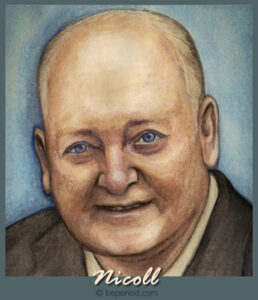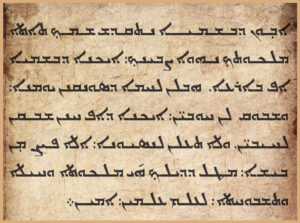 Through the book ‘The New Man’ by Maurice Nicholl, I learned that words and parables in the Bible can be explained well from the Fourth Way system of Gurdjieff and Ouspensky. This made the New Testament more meaningful to me, and things that were previously incomprehensible suddenly became crystal clear! Thus, I now also view the world-famous Lord’s Prayer from the perspective of The Fourth Way and Vedic Philosophy.
Through the book ‘The New Man’ by Maurice Nicholl, I learned that words and parables in the Bible can be explained well from the Fourth Way system of Gurdjieff and Ouspensky. This made the New Testament more meaningful to me, and things that were previously incomprehensible suddenly became crystal clear! Thus, I now also view the world-famous Lord’s Prayer from the perspective of The Fourth Way and Vedic Philosophy.
The gospels state that Jesus taught the Lord’s Prayer to his disciples. Therefore, it is important to understand what exactly he told his disciples about these words. What meaning did he give to this prayer? It seems clear that Jesus truly taught people to pray, inwardly, deeply from their hearts, not as a show for the outside world. Not as a supplication, by begging for favors and the like. So he would have interpreted the words of the prayer so that his disciples could understand what the rules in this affirmation of the Lord’s Prayer entail.
So, what does the Lord’s Prayer say? What is affirmed in it? How can we see it ourselves? And how can we practice it? I am now ‘opening a book’ on this, attempting to explain the teaching of the Lord’s Prayer in contemporary comprehensible words. More unusual terminology is described and explained elsewhere on this website.
True Prayer, or Just for Show
 From a young age, the Roman Catholic Lord’s Prayer was recited in my family and at school. When I was very young, it had a certain magic, but as I grew older it increasingly became an automatically recited tune, one I couldn’t relate to in its text. Ultimately, I stopped praying long before my teenage years. I was most involved with it in my earliest years, so it’s unfortunate that I didn’t receive a deeper (true) meaning of this prayer, for example in the usual weekly religious lessons at my primary school. My parents never spoke a word about the content of this prayer either. It’s actually incomprehensible that the Lord’s Prayer received almost no attention in the church or at school. It was simply recited as ‘the prayer that Jesus gave us’, nothing more, as if its meaning was obvious. However, this might be because even the clergy, the pastors, recited it as a template without giving it much thought. And if they did ponder on it, they didn’t share these thoughts with school children or churchgoers.
From a young age, the Roman Catholic Lord’s Prayer was recited in my family and at school. When I was very young, it had a certain magic, but as I grew older it increasingly became an automatically recited tune, one I couldn’t relate to in its text. Ultimately, I stopped praying long before my teenage years. I was most involved with it in my earliest years, so it’s unfortunate that I didn’t receive a deeper (true) meaning of this prayer, for example in the usual weekly religious lessons at my primary school. My parents never spoke a word about the content of this prayer either. It’s actually incomprehensible that the Lord’s Prayer received almost no attention in the church or at school. It was simply recited as ‘the prayer that Jesus gave us’, nothing more, as if its meaning was obvious. However, this might be because even the clergy, the pastors, recited it as a template without giving it much thought. And if they did ponder on it, they didn’t share these thoughts with school children or churchgoers.
By now, we know that an affirmation, intention, or prayer can only have an effect if spoken with full consciousness (or inwardly as contemplation) – deeply felt as well as intellectually understood. Investigative journalist Lynne McTaggart described in her book ‘The Intention Experiment’ how objective scientific research has shown the effects of intentions and prayers. Intentions work! But only if introduced and carried out correctly, with a quiet mind. Mechanically recited, a prayer has no effect and essentially no value. Only an understood and deeply felt prayer, as an affirmation, can mean something for our well-being or that of others. First, of course, for our inner well-being, purifying our mind and our attitude in daily life. Second, for the well-being of the world and all creatures within it.

I can refer to many versions of the Lord’s Prayer that have existed over the years as translations of the original. Originally the prayer was transmitted orally in Aramaic. After some time it was written down in Greek, then in Latin and in modern times in many languages, including Dutch.I am using the old Greek version from Matthew 6:9-13 in the Textus Receptus, with the translation that I learned as a Catholic boy, which didn’t include the last (more Protestant) line of the prayer. However, I have now added it.
Πάτερ ἡμῶν ὁ ἐν τοῖς οὐρανοῖς
Our Father, who art in heaven
ἁγιασθήτω τὸ ὄνομά σου
Hallowed be Thy name
ἐλθέτω ἡ βασιλεία σου·
Thy Kingdom come
γενηθήτω τὸ θέλημά σου, ὡς ἐν οὐρανῷ καὶ ἐπὶ τῆς γῆς
Thy will be done on earth as it is in Heaven
τὸν ἄρτον ἡμῶν τὸν ἐπιούσιον δὸς ἡμῖν σήμερον
Give us this day our daily bread
καὶ ἄφες ἡμῖν τὰ ὀφειλήματα ἡμῶν, ὡς καὶ ἡμεῖς ἀφίεμεν τοῖς ὀφειλέταις ἡμῶν
And forgive us our debts, as we also forgive our debtors
καὶ μὴ εἰσενέγκῃς ἡμᾶς εἰς πειρασμόν, ἀλλὰ ῥῦσαι ἡμᾶς ἀπὸ τοῦ πονηροῦ
And lead us not into temptation, but deliver us from evil
Ὅτι σοῦ ἐστιν ἡ βασιλεία καὶ ἡ δύναμις καὶ ἡ δόξα εἰς τοὺς αἰῶνας
For Thine is the Kingdom, and the power, and the glory forever
Aμήν
Amen
Octave
First and foremost, we can observe that the Lord’s Prayer consists of seven (or eight) lines of prayer. This prayer could thus have originated from the Law of Seven, also known as the Law of Octaves. The last line is not recited in all traditions and can be seen as a completion or reinforcement of the preceding seven lines. Like an octave. The first four lines are affirmative in nature. They are statements and thus affirmations. The next three lines are wishes or requests. The eighth line, as an octave, is again affirmative, concluded with Amen, which means ‘So be it’.

In the first line of prayer – Our Father, who art in heaven – the Father is mentioned, as in many places in the Bible. As a budding philosopher, I always found it strange, the masculine nature of God, the Absolute, the non-dual Creative Principle of all manifestations. But after some interpretation, it gets the right meaning in our dual world where all-surpassing neutrality is rare and thus difficult to comprehend. Here, the ‘father’ is intended as imagery: ‘fathers’ in the known plant and animal world provide seed, as the initiator, for the emergence of manifestations in a ‘mother’. And precisely so is also mentioned in the Bhagavad Gita. In this view, there’s also a Mother in which/whence manifestations sprout, which this prayer does not mention, but the Bhagavad Gita does: Prakriti, Mother Nature, the non-dual causal basis from which all manifestations are ‘born’. And Prakriti’s first manifestation in this universe is Akasha, the non-dual quantum field.
That ‘Father’ is in the heavens, which tells us that His existence is completely not of ‘the world’. Humans, being ‘of little faith’, often only know (and trust) earthly matters and seek salvation in them. So this line of prayer talks about the Source BEHIND all that’s earthly and calls upon it: the unmanifested Absolute from which all the manifested arises in the realm of spirit and matter. By ‘earthly’ or ‘the world’, all manifested worlds are meant: the causal world (Praktiti / Akasha), the subtle world (the Spirit), and the physical world (the material Creation). That ‘Father’ is thus present in everything, even in ourselves, and thus should not be invoked as an external entity. In this first line of the Lord’s Prayer, we are invoking our True Self.
The heaven represents the incomprehensible beyond-causal. From heaven the Father (the Absolute) has begotten the universe in His Nature (Prakriti), through the Holy Spirit (Purusha).
The second line of prayer – Hallowed be Thy name – is imperative (in Greek written in aoristus, which shows that it is eternally valid). So, what name is that? And what does His name represent? This isn’t made clear in this prayer. But it is mentioned in other scriptures: it’s the primal sound from which everything emerged: Aum (or Ôm). The concept Nada Brahma explains this as: ‘God’s voice of Silence’; or ‘the All is Sound’, an unmanifested sound, a primal vibration of the Absolute from which everything arises. The Bible also states ‘In the beginning was the Word, and the Word was with God, and the Word was God’. ‘His name’ is thus the causal Primal Sound, which man has articulated as Aum. In Christian religion it became Amen. (Even our own given name is the articulation of our individual manifestation.)
This causal Primal Sound can thus be seen as God’s seed from the first stanza: initiating everything. The Aum sound is thus sacred in many eastern religions. All prayers, as well as all actions, begin and end with it. Through this, every action is surrendered to the Absolute by uttering His name, and whereby the result is pre-emptively dedicated to That (Tat), the Absolute Consciousness. In the east, ‘Your name is (still extensively) hallowed.
Aum, as sound or primal vibration, can be seen and understood as the Name of the Absolute, which is holy, and holy stands for nothing less than Ultimate Wholeness, or Unity.
The third line of the prayer, “Your Kingdom come”, acts as an affirmation focused on our purpose or destiny. Jesus frequently spoke of the Kingdom of God, which is already within us. We have seemingly lost touch with this kingdom. This has been described in Genesis as the fall from paradise. According to the myth of Eve, the blame was placed on Eve for consuming the apple, representing duality, from the Tree of Knowledge. Through this act, humanity gained knowledge of duality and the power of distinction. This plunged humanity into a world of duality, leading to a loss of the perpetual state of the Kingdom of God. We lost our childlike unity, the total (royal) spontaneity and pure unity, and became beings of thought and emotion entrenched in opposites, experiencing resistance everywhere. And unless we regain that childlike state, Jesus explained, we cannot re-enter the Kingdom of Heaven (“I tell you the truth, unless you change and become like little children, you will not enter the kingdom of heaven”). Hence, Your Kingdom will come through the restoration of inner unity in ourselves, achieved through Self-realization.
 The fourth line, “Your will be done, on earth as it is in heaven”, emphasizes that everything, including humanity, is subject to laws—both Absolute Laws (heaven) and relative laws (earth). What can we comprehend by Absolute Laws? These are irrefutable laws we, as manifestations of humanity, cannot evade. The Advaita paradigm stems from the illusion of duality, where everything essentially is “non-dual” (a-dvaita). All that which we perceive as manifested is thus like the Absolute Self (or God, if you like): One. Then it is that Your will must be done within us: realizing unity within oneself, or becoming a true individual (individual means un-divided). Returning to your original state of paradise or kingdom by acting according to that Will. There is also no escaping the karmic law; it too will be done as Your will.
The fourth line, “Your will be done, on earth as it is in heaven”, emphasizes that everything, including humanity, is subject to laws—both Absolute Laws (heaven) and relative laws (earth). What can we comprehend by Absolute Laws? These are irrefutable laws we, as manifestations of humanity, cannot evade. The Advaita paradigm stems from the illusion of duality, where everything essentially is “non-dual” (a-dvaita). All that which we perceive as manifested is thus like the Absolute Self (or God, if you like): One. Then it is that Your will must be done within us: realizing unity within oneself, or becoming a true individual (individual means un-divided). Returning to your original state of paradise or kingdom by acting according to that Will. There is also no escaping the karmic law; it too will be done as Your will.
Relative laws too, proceed according to His will: everything in the universe adheres to these divine laws. From the birth of a baby to the birth of a black hole; from the death of a person to the end of the universe itself. In all, nothing is lost, for the law of conservation of energy—or the preservation of primal sound (Aum)—also forms part of Your will be done.
In the fifth line of the Lord’s Prayer, which Jesus taught to humanity, we make a request: ‘Give us this day our daily bread.’ Originally, in Old Greek, it reads: ‘Ton arton imon ton epiousion dhos imin simeron’ (τὸν ἄρτον ἡμῶν τὸν ἐπιούσιον δὸς ἡμῖν σήμερον). Ton arton imon means our bread; epiousios means supersubstantial; dhos imin means see us, and simeron means today. This results in something like: ‘See us today (with) our supersubstantial bread.’ A somewhat peculiar sentence, but already more profound than simply asking for bread. I believe the best translation from the Old Greek would be (which was already a translation because Jesus spoke Aramaic): ‘Grant us today our esoteric nourishment.’ This is genuinely different from a daily sandwich. We are asking for something inspiring, yet profoundly simple, for bread is basic and simple sustenance. We are not asking for an elaborate meal, not for intricate theories, but for that which spiritually nourishes us every day and deepens our being. With such a request, we are open to what is offered to us for the sake of inner development.
We sometimes have a lot on our plate, of which we don’t always understand the reason, but all of it could represent supersubstantial ‘bread.’ Besides spiritual nourishment, such as insights or wise words, it’s essential to realize that this ‘bread’ might also be less palatable. We may not recognize it as sustenance and then refuse to ‘eat’ it. But in my opinion, in the Lord’s Prayer, we are asking to be given that which will serve as sustenance for our inner development, whether it’s pleasant or not. So, in essence, grant us daily nourishing insights, as well as nourishing difficulties, for they reveal to us the inner ‘workplace’ on the path to inner liberation.
In the sixth line – “And forgive us our debts, as we also forgive our debtors” – we present a second request to the Absolute within us. This speaks of an inner wish, or perhaps better termed, an inner endeavor, addressed to the highest authority within ourselves. From our psyche, we seek relief from pettiness and the actions borne out of ignorance, in the same way, we would not blame others for their ignorant acts. It’s about the process of self-purification, letting go of undesired inner attitudes and external actions that act as obstructions in our path to unity and disrupt our unification process. These obstructions are dual in nature, consisting of what we see as “wrong” but also what we perceive as “right”. All our internal applause and booing, praises and criticisms, anything that hinders our process of relinquishing the ego, is included. All things we should giving up and offering can be considered as debts because they withheld us from our divine state. Debts – owed to ourselves – can be settled from a higher (and the only right) state of being, known by Buddhi, our highest discernment. We just need to follow this, and ‘follow’ is simply another word for discipline.

The seventh prayer rule – “And lead us not into temptation (enticement), but deliver us from evil” – is the wish not to be led any longer by unconscious desires, motivations, greed, and gratification, which is also beautifully described in the Bhagavad Gita. Most often, temptations and trials are triggered by the allure of ‘earthly treasures.’ The pursuit of ‘having,’ of profit, of material possessions, prestige and status, power and fame, always obstructs inner development. It’s the difference between having and being. We cannot serve God and mammon equally, is a well-known truth.
In essence, we are asking that the temptation or encitement that holds us unconsciously will have less grip on our minds. Yielding to temptations draws us back into a lower and more mechanical state of mind, and thus of thinking, feeling, and acting. Then there are actual trials, as we know from the story of Jesus in the desert: ‘Do I sell my soul to the devil or not?’ But we are faced with this question only in extreme situations, such as in times of war or oppression, when we start to wonder whether we should collaborate or not.
This is connected to the request to be delivered from evil. And what is that evil? Ouspensky also spoke of ‘good and evil,’ or ‘right and wrong,’ which are completely opposed (dual) to each other. He explained that this should not be seen (primarily) in moral terms but in the light of our Self-realization. With evil, wrong, and the negative, he meant everything that hinders our realization. It is everything that keeps us petty and selfish. Good or right represents everything that promotes our realization. It’s that simple. So, it doesn’t (primarily) refer to evil leaders or bad people and their (violent) actions, but must first be understood within ourselves. “What obstructs my self-realization?” should be our question if we want to recognize and understand the meaning of evil. Ouspensky suggests that we will ultimately arrive at our ‘primary fault,’ our most limiting trait in our inherent nature or character, in our individualized essence. This can then be resolved by getting to know it, understanding it, and lovingly leaving it behind in reevaluation. An interesting area of exploration!
The octave is completed with the final line, once again affirming: “For Yours is the kingdom and the power and the glory forever.” In other words, none of this belongs to us, as individual ego-characters. As human beings, experiencing ourselves as individuals, we owe everything to That (Tat) which we truly are, our highest Essence, the Self that is the same in everyone and everything, of which there is no second. From this, we derive all our (life) power and energy, all our conscious perception, all our knowledge, all our talents, all our thoughts and actions, all our feelings of happiness and unhappiness, and it also enables us to experience and radiate love. And this is for eternity! An affirmation to behold.
So, the eighth stanza is omitted by the Catholics. It seems to be a somewhat lofty stanza that is best explained as our ego-mind not being able to claim anything, absolutely nothing, of the divine, although it does so again and again (daily) out of ignorance. So, we must always be careful not to seek this divine outside of ourselves and not to address it, for example, in a prayer. It is within us! And so, we can state: “For in (and within) Myself is the kingdom and the power and the glory forever.” We are it… The power of identification and the claiming of ‘merits’ is one of the greatest human problems/weaknesses in our world. We identify ourselves with many things like appearance, talents, achievements, knowledge, writings, prestige, and so on. We cannot claim any of these as personal merits. Everything is given to us as temporary human form. Moreover, much of the beauty on Earth is now threatened and destroyed by human ego-driven actions, as humans claim it as their own.
As closure the ‘amín,’ the ‘amen’, the ‘so be it,’ as the final affirmation of the entire prayer.
Amin, Amen, Aum

